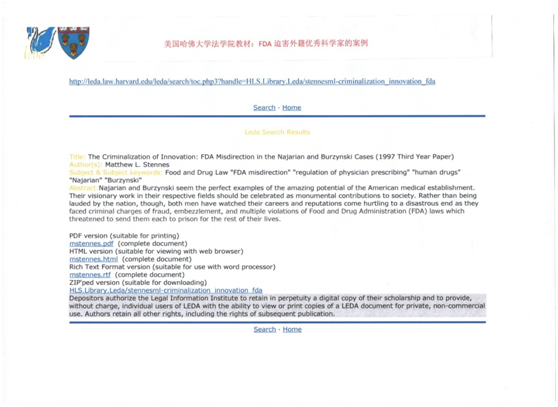In collaboration with Cell Therapy Institute, the Children’s Hospital of Zhengzhou (Henan) in CHINA is now accepting, from around the world, patients with DMD and other forms of rare childhood hereditary muscle diseases for treatment with Myoblast Transfer Therapy (MTT). Those truly concerned with patients’ welfare have finally made available a more viable treatment for the rare, childhood, fatal and debilitating disease. Patients seeking treatment may contact us at cti@celltherapy.com.

MTT was pioneered and developed by Professor Peter K. Law, Ph.D. to treat DMD unto fast-track Phase III clinical trials with approval to charge for 5 consecutive years following progress reviews by the Center for Biologics Evaluation and Research (CBER). At the height of his career, Professor Law was forced to abandon his mission for political and financial reasons. By disqualifying Professor Law, he was forced out of the USA in order to continue his mission.
Please watch the video on Youtube (English) or on Tencent (Chinese) for physical improvement after MTT as documented by representative patients (24 cases), parents and news media.
Many of the DMD boys treated by Dr. Law’s team 20 years ago are still alive in their 30’s and 40’s. Unfortunately, within these decades, millions of DMD patients lost the opportunity to be treated by MTT due to the actions or inactions of the FDA.
In 2016, US FDA approved Exondys 51 as the first DMD drug. FDA News Release on September 19, 2016 documented that, “A clinical benefit of Exondys 51, including improved motor function, has not been established” and that, “The most common side effects reported by participants taking Exondys 51 in the clinical trials were balance disorder and vomiting” (Attachment 1). The Associated Press on the same day called Exondys 51 “the largely unproven medication.”
Table 1. Efficacy Comparison
| MTT | Exondys 51 |
|---|---|
| 1. 100% dystrophin production | 0.28% dystrophin m-RNA increase |
| 2. 70% muscle fiber increase and histology improved | None |
| 3. 123% strength increase in 18 months | None |
| 4. 48.7% decrease in serum CPK in 1 year | None |
| 5. 19 % increase in breathing capacity | None |
| 6. Physical capacity improved | None |
| 7. Physical capacity improved | None |
| 8. For DMD, BMD and other MDs | For 13% DMD with Exon 51 skipping |
Table 2. Safety Comparison
| MTT | Exondys 51 |
|---|---|
| 280 cases published | 8 cases + 4 untreated controls, unpublished |
| 100% safe | Balance disorder/vomiting |
Table 3. Logistics Comparison
| MTT | Exondys 51 |
|---|---|
| One time intramuscular injection | Daily intravenous injection |
| Lifelong benefits | No clinical benefit |
| US$150,000- total, FDA approved | US$300,000- per year |
Instead of approving a better form of treatment for DMD patients 17 years ago, the FDA stopped Professor Law’s MTT clinical trials, physically destroyed all myoblasts without testing, and capriciously character-assassinated the foreign Professor Law by disqualifying him as an investigator. The non-profit Cell Therapy Research Foundation that he founded went bankrupt after FDA would not allow the study to move forward. The destroyed myoblasts represented years of painstaking R&D and financial investment. They belonged to the same batches of cells that kept patients alive as of today. Similar legalized corruption and conspiracy have been subjects lectured in Harvard Law School (Attachment 2).
Attachment 1. FDA News Release September 19, 2016 (abridged)
FDA grants accelerated approval to first drug for Duchenne muscular dystrophy
The U.S. Food and Drug Administration today approved Exondys 51 (eteplirsen) injection, the first drug approved to treat patients with Duchenne muscular dystrophy (DMD). Exondys 51 is specificallyindicated for patients who have a confirmed mutation of the dystrophin gene amenable to exon 51 skipping, which affects about 13 percent of the population with DMD.
The FDA has concluded that the data submitted by the applicant demonstrated an increase in dystrophin production that is reasonably likely to predict clinical benefit in some patients with DMD who have a confirmed mutation of the dystrophin gene amenable to exon 51 skipping. A clinical benefit of Exondys 51, including improved motor function, has not been established.
Under the accelerated approval provisions, the FDA is requiring Sarepta Therapeutics to conduct a clinical trial to confirm the drug’s clinical benefit. The required study is designed to assess whether Exondys 51 improves motor function of DMD patients with a confirmed mutation of the dystrophin gene amenable to exon 51 skipping. If the trial fails to verify clinical benefit, the FDA may initiate proceedings to withdraw approval of the drug.
The most common side effects reported by participants taking Exondys 51 in the clinical trials were balance disorder and vomiting.
The FDA granted Exondys 51 fast track designation, which is a designation to facilitate the development and expedite the review of drugs that are intended to treat serious conditions and that demonstrate the potential to address an unmet medical need. It was also granted priority review and orphan drug designation. Priority review status is granted to applications for drugs that, if approved, would be a significant improvement in safety or effectiveness in the treatment of a serious condition. Orphan drug designation provides incentives such as clinical trial tax credits, user fee waiver and eligibility for orphan drug exclusivity to assist and encourage the development of drugs for rare diseases.
The FDA, an agency within the U.S. Department of Health and Human Services, protects the public health by assuring the safety, effectiveness, and security of human and veterinary drugs, vaccines and other biological products for human use, and medical devices.
Attachment 2






